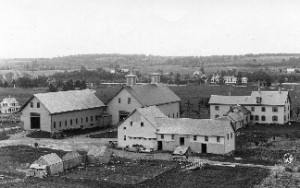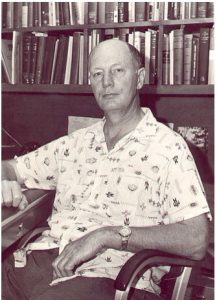About
The J. Franklin Witter Teaching & Research Center in Old Town is the home for the college’s teaching and research programs in animal sciences and sustainable agriculture. The Center has two units: the Witter Farm, adjacent to the University of Maine campus and Rogers Farm, located several miles from the Orono campus. The Center is one of five Maine Agricultural and Forest Experiment Stations (MAFES) across the state that is a scientific research center investigating potential improvements to food production and agribusiness. Experiment Stations are a mandate of Land-Grant Universities, like the University of Maine.
With both farms located near the Orono campus these facilities are an integral part of the college’s teaching programs. In addition to dairy and equine courses at the Witter Farm, a student group, the UMaine Applied Dairy Cooperative of Organized Working Students—known as the UMAD COWS—is fully involved in operation of the dairy. The equine program uses standard-bred horses for classes and cooperative work experience.
At Rogers Farm, students run a community-supported agriculture project, the Black Bear Food Guild, which supplies organically grown vegetables to public shareholders throughout the summer.
Research at the Witter Farm supports Maine’s dairy and equine industries. Current projects include studies on fertility problems in horses and cows, and horse related diseases.
Scientists at Rogers Farm are developing new approaches for organic agriculture with current research including studies on organic grain production, bread wheat varieties, bee pollination, potato rotations using winter canola and mustard, Spotted Wing Drosphilia monitoring, organic fertilization’s and weed control methods, and the Master Gardner program.
History of the Witter Center
 For much of the University of Maine’s history, the Orono campus was home to cows and chickens as well as students. In the spring of 1947, Rogers Farm was purchased as additional land to grow forage for the University’s dairy herd. Approximately 11 acres of the 100 acre farm were set aside for crop research, this eventually grew to 20 acres. Due to pressures of a growing campus and a fire that nearly leveled one of the University’s old dairy barns in 1972, however, an animal science research facility, the Witter Farm, was constructed on the edge of the University’s land in Old Town and the dairy cows were moved off-campus. Witter Farm housed the dairy herd along with some poultry and sheep. Witter and Rogers Farms were able to complete much-needed renovations in 1996 and again in 2006. The Harold Chute Center was constructed in the summer of 2013.
For much of the University of Maine’s history, the Orono campus was home to cows and chickens as well as students. In the spring of 1947, Rogers Farm was purchased as additional land to grow forage for the University’s dairy herd. Approximately 11 acres of the 100 acre farm were set aside for crop research, this eventually grew to 20 acres. Due to pressures of a growing campus and a fire that nearly leveled one of the University’s old dairy barns in 1972, however, an animal science research facility, the Witter Farm, was constructed on the edge of the University’s land in Old Town and the dairy cows were moved off-campus. Witter Farm housed the dairy herd along with some poultry and sheep. Witter and Rogers Farms were able to complete much-needed renovations in 1996 and again in 2006. The Harold Chute Center was constructed in the summer of 2013.
J. Franklin Witter (1906 – 1982)
John Franklin (Frank) Witter grew up on a farm in Frederick, Maryland. His father was a professional livestock showman. Frank  spent much of his youth learning about the different breeds of farm animals. He saw farming as a way of life. As such he would a pursue a career in veterinary science. He completed a Bachelor’s of Science in Agriculture in 1928 at the University of Maryland and would attend veterinary school at Michigan State College the following year. In 1932 he accepted a faculty position at the University of Maine’s Department of Animal Pathology where he conducted research, taught, and published papers specializing in poultry health and pathology until he retired in 1971. Throughout his career he served as head of UMaine’s Department of Animal Pathology, Treasure and President of the Maine Veterinary Association, and lifetime member of the American Association of Avian Pathologists (AAAP).
spent much of his youth learning about the different breeds of farm animals. He saw farming as a way of life. As such he would a pursue a career in veterinary science. He completed a Bachelor’s of Science in Agriculture in 1928 at the University of Maryland and would attend veterinary school at Michigan State College the following year. In 1932 he accepted a faculty position at the University of Maine’s Department of Animal Pathology where he conducted research, taught, and published papers specializing in poultry health and pathology until he retired in 1971. Throughout his career he served as head of UMaine’s Department of Animal Pathology, Treasure and President of the Maine Veterinary Association, and lifetime member of the American Association of Avian Pathologists (AAAP).
For more information of Frank Witter’s life and career see his professional biography by the AAAP professional
Associated farms & organizations
College of Earth, Life, and Health Sciences
Maine Agricultural & Forest Experiment Station
- Maine Agricultural & Forest Experiment Station
- Aroostook Farm
- Blueberry Hill Farm
- Highmoor Farm
- Roger Clapp Greenhouses & Lyle E. Littlefield Ornamentals Trial Garden
- Rogers Farm
Partners
- Maine Organic Farmers and Gardeners Association
- Master Gardener Demonstration Garden
- Master Gardener Volunteers
